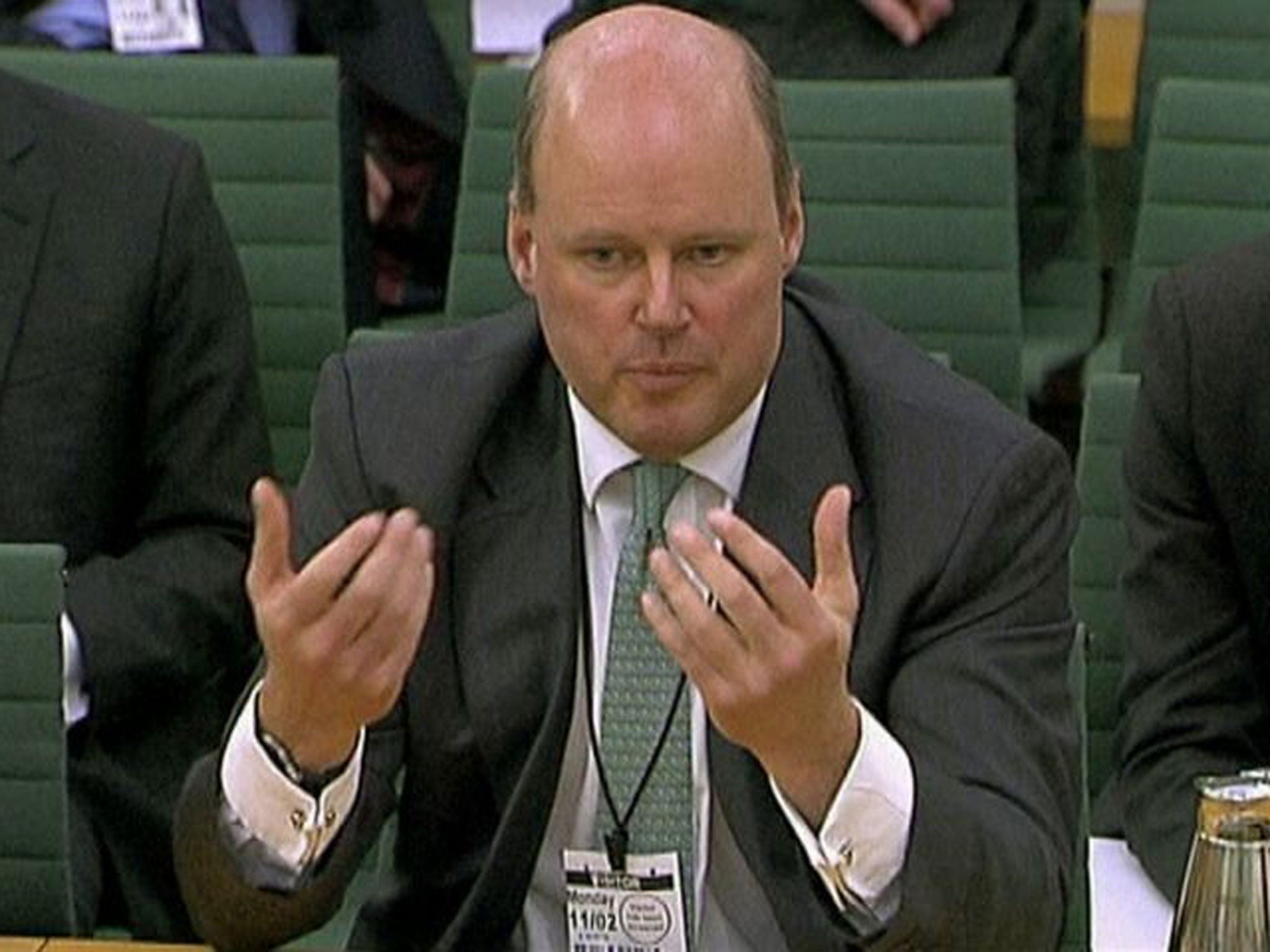£8 million a year? That’s modest, says RBS chief
Fury as chairman of shamed bank defends CEO’s remuneration to MPs

Stephen Hester, the chief executive of Royal Bank of Scotland, is only “modestly paid” on an annual package of £7.8m, the bank’s chairman claimed tonight.
Sir Philip Hampton’s startling observation came as a series of current and former RBS executives condemned their own traders for a “lack of morals” and “selfishness” which led to the taxpayer-owned bank being fined £390m by US regulators for rigging the Libor rate, which is used to set prices of financial contracts.
Mr Hester described the traders’ conduct as “disgraceful” and said it “brought shame on the bank”. He was also highly critical of the banking industry’s “hubris” and “excessively self-centred culture”.
But despite removing his investment banking chief, John Hourican, as a result of the scandal, Mr Hester insisted he would not give up his bonus. He told members of the Parliamentary Commission on Banking Standards: “We have done huge things to rescue the company for society and for its stakeholders. It is entirely proper for me to be assessed on what we have done. I believe this nation is off the hook for a lot of things.” Asked why Mr Hester could still be handed a bonus despite admitting a failure on his watch, Sir Philip said: “Stephen is doing one of the most difficult, demanding and challenging jobs in world business. He has been paid well below the market rate compared to others in the same job.”
Mr Hester’s £7.8m package is made up of a basic salary of £1.2m, plus a maximum annual bonus of £2.4m and a further £4.2m that can be earned through the bank’s long term incentive schemes.
Sir Philip and Mr Hester were called before the Commission after the Financial Services Authority report into the bank’s role in Libor fixing highlighted a series of “management failings”. Traders were still attempting to fix Libor rates in 2010, a year after they and the bank knew watchdogs were investigating the bank.
Sir Philip defended the decision to let Mr Hourican go and not his deputy Peter Nielsen, the former head of interest rates. He said it had been decided that RBS needed “a single point of accountability and not a series of mass assassinations”.
Mr Hourican said the bank was slow to react to the scandal because management were focused on the “cardiac arrest” RBS had been through during the financial crisis. He said: “It is utterly reprehensible that people, at that moment, felt they could continue with the behaviours that they were doing and we didn’t find it. But it is the case that we prioritised the existence of this bank for the first number of months and years of managing it. It is not an excuse. It is an explanation to this committee of where we were.”
He added that it was right for him to pay the price as “the captain on the bridge” when the Libor fixing was occurring.
Johnny Cameron, who stepped down as RBS’s investment banking chief and has been effectively banned from the financial sector for his role in the bank’s near-collapse, said he was “shattered” by the scandal. He added: “It is shattering to us, we tried to appoint good people, but 15,000 people … you can’t impose moral standards on people who don’t want to be moral.”
He insisted that traders were generally closely monitored but: “We just didn’t think that this [Libor] was a rate that could be fiddled.”
The Commission was told that RBS had looked at the affair and had concluded that it had not made any money from Libor rigging. Traders, however, profited at the expense of others at the bank. Mr Hester insisted that the most serious failings in the bank’s trading operation were “fixed within a handful of weeks”. He described what went on as “crookedness”. He has given up bonuses in previous years, but is likely to receive something this time around – although the final amount may not be revealed until the bank publishes its annual report. He later added: “I will do my absolute best to rescue the position at RBS and make it a better institution. That includes trying to eliminate control and reputation failures of this kind. The mess that RBS represented is not yet cleared up and there are some hard yards to travel but we are doing our best.”
However, Commission chairman Andrew Tyrie rebuked RBS for failing to be clear on how its bonus pools will be cut to reflect the fine. It has been said that investment bankers will meet the cost through lower bonuses rather than the taxpayer.
Mr Tyrie said: “We were not given sufficient confidence today that the arrangement for funding the fines from bonuses will do what it says on the tin. This must be more than an exercise in creative accounting. It would be all too easy to artificially adjust a bonus pool, the size of which is yet to be decided.”
Subscribe to Independent Premium to bookmark this article
Want to bookmark your favourite articles and stories to read or reference later? Start your Independent Premium subscription today.

Join our commenting forum
Join thought-provoking conversations, follow other Independent readers and see their replies